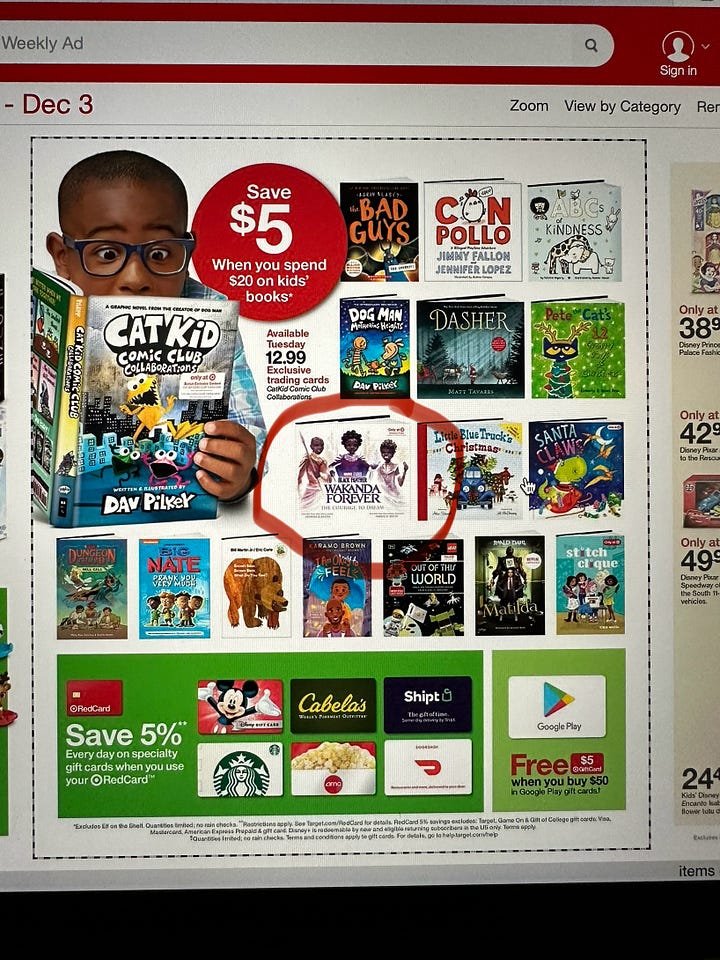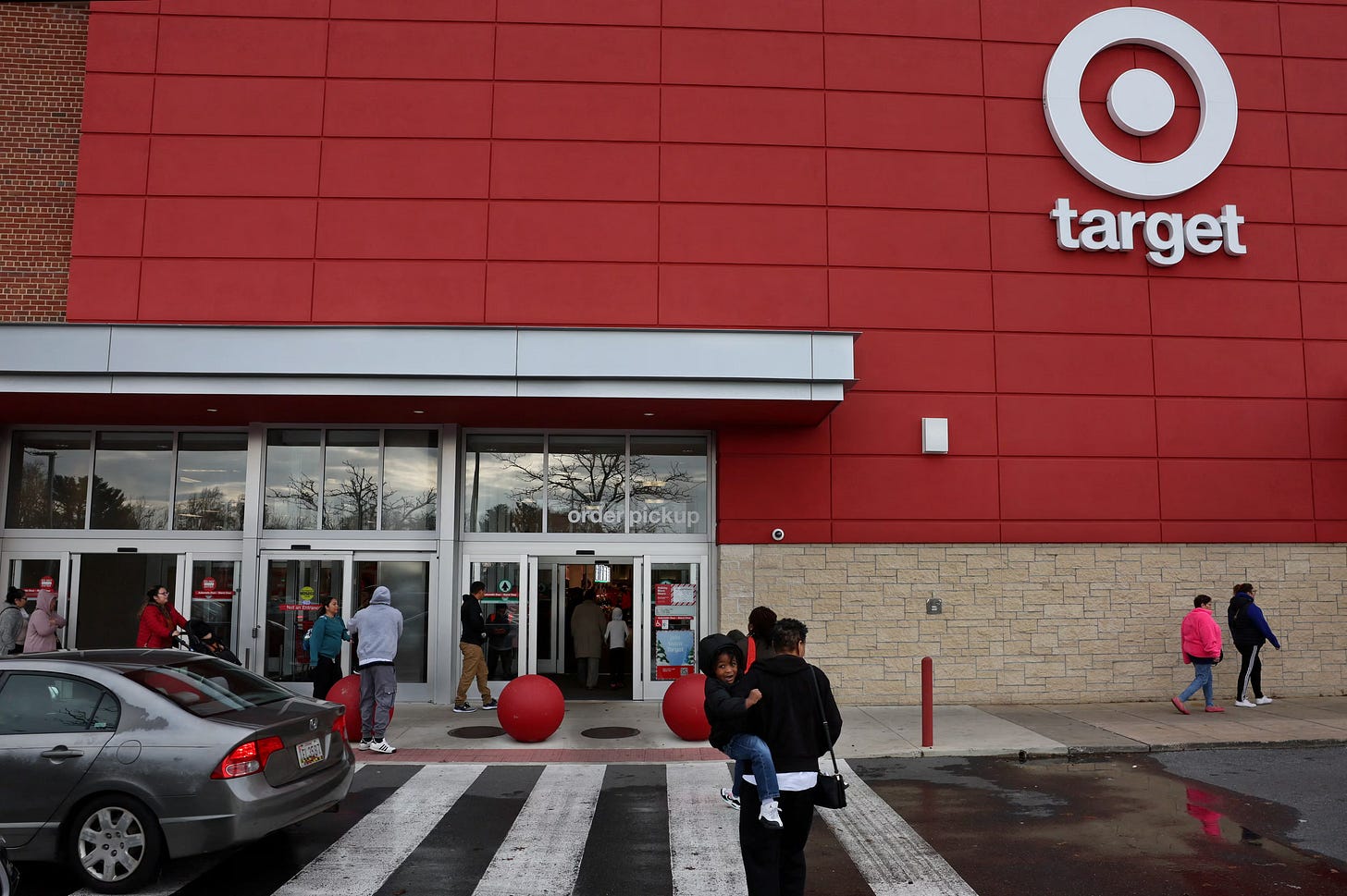Don't Buy My Books At Target
On the importance of putting spending money where we are wanted.
During my career, I have had a good relationship with Target. So much so that when my first book was released, it appeared on screens in their stores across the country. Later, one of my picture books had an exclusive Target edition—a distinction that, in publishing, can mean the difference between a book fading into the abyss of backlist titles and a book that reaches shopping carts. These were moments of pride, of visibility, of feeling like my work, my words, and by extension, the communities I write for were being seen.


But these moments did not happen in a vacuum. They occurred in the years following the summer of 2020, after the world watched a Black man beg for his life on the concrete, after America’s conscience—or at least its corporations—felt compelled to engage in what could only be described as a performance of reckoning. Suddenly, Black authors were getting national promotions, Black artists were getting commissions, Black-owned businesses were seeing their products prominently displayed on shelves. The language of “commitment” and “equity” was everywhere. Companies pledged millions to racial justice initiatives, boards of directors were told to diversify, executives fumbled through apologies for past inaction. For a moment, it felt like something might actually shift.
But power does not concede itself so easily.
Target has announced that it will be scaling back its DEI efforts, retreating from partnerships with Black businesses and creators. This is not surprising. It is, in fact, the most predictable thing. Just a few years later, we are watching the rapid undoing of what was always tenuous at best. DEI departments gutted. Pledges unfulfilled. Partnerships quietly dissolved. Target, once an eager participant in the optics of progress, has now begun its retreat. Its once-expansive efforts to highlight Black creators, to bring in products from marginalized entrepreneurs, to shape itself into a brand that could wear its supposed social consciousness like a badge—all of it is being scaled back. And not subtly. This is happening in full view, at the precise moment when the political tides are shifting, when Trump has returned to office, and when the so-called “war on wokeness” has become a rallying cry.
It is not lost on me that the moment the cost of “allyship” became tangible—when the backlash came, when the profits were threatened, when the comfort of their bigoted consumers was at stake—so many corporations found themselves scrambling back to safety, shedding the weight of promises they never intended to keep. Because that’s what this was all along: a strategy, a momentary bending to the pressures of public opinion rather than any genuine investment in justice. And now, the pendulum swings back.
But I refuse to remain part of the performance, despite the likely financial toll. So, I am asking readers to no longer preorder my forthcoming novel at Target, nor continue to purchase any of my books from them.
It is not lost on me that Target is one of the largest retailers in the country. That their reach extends into nearly every city and suburb, that for many, their red bullseye is less a store and more a ritual. I know what it means to ask people to not support my work there. I know that the weight of this decision is not abstract. It is financial. It is logistical. It is the difference between a book moving thousands of copies in a single week and one that struggles to find its audience.
But I make this request with full knowledge of the stakes. This is not easy. But it is necessary.
There is a long history of Black people in this country being told that survival requires our silence. That to demand dignity, to demand reciprocity, is to ask for too much. That we should be grateful for what little space we have been given, for the brief, conditional moments when the doors to visibility swing open. And yet, so many of us have also understood that silence is complicity. That to accept the fickle generosity of corporations—to take their money, their promises, their fleeting commitments—without holding them accountable when they are wrong is to participate in our own erasure.
This is why we boycott. This is why we withhold. Because in America, power only moves when it feels loss. And that loss in our society is so deeply tied to economic capital. The Montgomery Bus Boycott was not won on morality alone—it was won by Black people making it clear that their dollars were worth more than their suffering. When Rosa Parks refused to move, she was not simply resisting segregation; she was signaling a strategy, a tactic as old as our subjugation itself. Economic withdrawal has long been one of the only tools available to the marginalized, one of the only ways to remind those in power that our labor, our art, our existence is not an afterthought—it is the very foundation upon which their wealth is built.
When Target and companies like it pull back their DEI efforts, when they decide that the temporary discomfort of backlash is not worth the ongoing commitment to equity, they are making a calculation. They are betting that the people who care will continue to shop. That we will continue to write, create, build, and produce, all while knowing that the institutions that distribute our work have no real investment in us. They are betting that we will do what we have always been forced to do—keep moving, keep striving, keep selling our stories in stores that, when the tides turn, will discard us as easily as they once claimed us.
But what happens when we don’t play along? What happens when we refuse to be pawns in their seasonal commitments to justice? What happens when we say no?
Some will call it performative. Some will say that one writer refusing to sell in Target changes nothing, that withholding a few purchases does not dent a billion-dollar empire. But history tells us otherwise. History tells us that when we divest, when we pull back, when we refuse to fund our own exploitation, things shift. Not overnight, not immediately, not without resistance. But they shift.
The truth is, these companies will only do what they believe they can get away with. They will only abandon DEI efforts if they think the backlash will not cost them. They will only discard Black and marginalized creators if they are confident that those same creators will continue to feed their platforms. If we do not create consequences, they will never act differently.
This is not just about Target. This is about every corporation that rode the wave of 2020’s so-called reckoning only to retreat the moment the cost became inconvenient. It is about every brand that plastered Black Lives Matter across their marketing but refused to challenge the structures that keep Black lives precarious. It is about every executive who signed a pledge, made a promise, and then, years later, quietly erased every trace of that commitment.
So, I am choosing to act. Not because it is easy. Not because it does not come at a cost. But because if we do not stand for something now, we are only paving the way for more of the same. There must be repercussions. There must be accountability. Or else, what was the point of any of it?
If you want to preorder my latest book from somewhere other than Target, some of my favorite options are below:





Heard! I already pre-ordered from Bookshop.org to support independent booksellers. I appreciate your integrity as it calls me to move in alignment with my values as well.
Your integrity and commitment to justice and liberation are a lighthouse, thank you ❣️